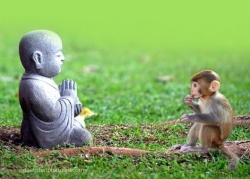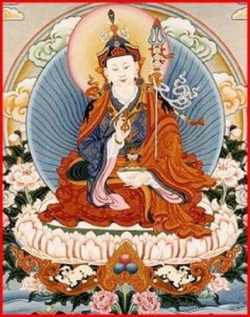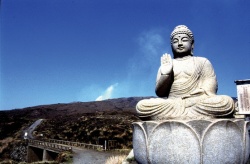Punna Sutta
To Punna
translated from the Pali by
Thanissaro Bhikkhu
Translator's note
In the following translation, the passage in braces { } is contained in the Thai edition of the Pali canon, but not in the PTS edition.
SN 35.88
Then Ven. Punna went to the Blessed One and on arrival, having bowed down to the Blessed One, sat to one side. As he was sitting there he said to the Blessed One, "It would be good if the Blessed One would teach me the Dhamma in brief so that, having heard the Dhamma from the Blessed One, I might dwell alone in seclusion: heedful, ardent, & resolute."
"There are, Punna, forms cognizable via the eye agreeable, pleasing, charming, endearing, fostering desire, enticing. If a monk relishes them, welcomes them, and remains fastened to them, then in him relishing them, welcoming them, and remaining fastened to them there arises delight. From the origination of delight, I tell you, comes the origination of suffering and stress.
"There are sounds cognizable via the ear... aromas cognizable by the nose... flavors cognizable via the tongue... tactile sensations cognizable via the body...
"There are ideas cognizable via the intellect — agreeable, pleasing, charming, endearing, fostering desire, enticing. If a monk relishes them, welcomes them, and remains fastened to them, then in him relishing them, welcoming them, and remaining fastened to them — there arises delight. From the origination of delight, I tell you, comes the origination of suffering and stress.
"There are forms cognizable via the eye agreeable, pleasing, charming, endearing, fostering desire, enticing. If a monk does not relish them, welcome them, or remain fastened to them, then in him — not relishing them, not welcoming them, not remaining fastened to them — there arises no delight. From the cessation of delight, I tell you, comes the cessation of suffering and stress.
"There are sounds cognizable via the ear... aromas cognizable by the nose... flavors cognizable via the tongue... tactile sensations cognizable via the body...
"There are ideas cognizable via the intellect — agreeable, pleasing, charming, endearing, fostering desire, enticing. If a monk does not relish them, welcome them, or remain fastened to them, then in him — not relishing them, not welcoming them, not remaining fastened to them — there arises no delight. From the cessation of delight, I tell you, comes the cessation of suffering and stress. {By this means, Punna, you are not far from this doctrine and discipline."
When this was said, a certain monk said to the Blessed One, "Here is where I am ill at ease, lord, for I don't discern, as they actually are present, the origination, the passing away, the allure, the drawback, and the escape from the six spheres of contact."
"Then what do you think, monk. Do you regard that 'The eye is not mine. It is not my self. It is not what I am'?"
"Yes, lord."
"Very good, monk. When it is well-seen by you with right discernment that 'The eye is not mine. It is not my self. It is not what I am,' then the first sphere of contact will be abandoned by you, for the sake of no further becoming in the future.
"Do you regard that 'The ear is not mine... The nose is not mine... The tongue is not mine... The body is not mine...
"Do you regard that 'The intellect is not mine. It is not my self. It is not what I am'?"
"Yes, lord."
"Very good, monk. When it is well-seen by you with right discernment that 'The intellect is not mine. It is not my self. It is not what I am,' then the sixth sphere of contact will be abandoned by you, for the sake of no further becoming in the future.}
"Well then, Punna. Now that I have instructed you with a brief instruction, in which country are you going to live?"
"Lord, there is a country called Sunaparanta. I am going to live there."
"Punna, the Sunaparanta people are fierce. They are rough. If they insult and ridicule you, what will you think?"
"If they insult and ridicule me, I will think, 'These Sunaparanta people are civilized, very civilized, in that they don't hit me with their hands.' That is what I will think, O Blessed One. That is what I will think, O One Well-gone."
"But if they hit you with their hands, what will you think?"
"...I will think, 'These Sunaparanta people are civilized, very civilized, in that they don't hit me with a clod.'..."
"But if they hit you with a clod...?"
"...I will think, 'These Sunaparanta people are civilized, very civilized, in that they don't hit me with a stick.'..."
"But if they hit you with a stick...?"
"...I will think, 'These Sunaparanta people are civilized, very civilized, in that they don't hit me with a knife.'..."
"But if they hit you with a knife...?"
"...I will think, 'These Sunaparanta people are civilized, very civilized, in that they don't take my life with a sharp knife.'..."
"But if they take your life with a sharp knife...?"
"If they take my life with a sharp knife, I will think, 'There are disciples of the Blessed One who — horrified, humiliated, and disgusted by the body and by life — have sought for an assassin, but here I have met my assassin without searching for him.' [1] That is what I will think, O Blessed One. That is what I will think, O One Well-gone."
"Good, Punna, very good. Possessing such calm and self-control you are fit to dwell among the Sunaparantans. Now it is time to do as you see fit."
Then Ven. Punna, delighting and rejoicing in the Blessed One's words, rising from his seat, bowed down to the Blessed One and left, keeping him on his right side. Setting his dwelling in order and taking his robe and bowl, he set out for the Sunaparanta country and, after wandering stage by stage, he arrived there. There he lived. During that Rains retreat he established 500 male and 500 female lay followers in the practice, while he realized the three knowledges and then attained total (final) Unbinding.
Then a large number of monks went to the Blessed One and on arrival, having bowed down to him, sat to one side. As they were sitting there, they said to him, "Lord, the clansman named Punna, whom the Blessed One instructed with a brief instruction, has died. What is his destination? What is his future state?"
"Monks, the clansman Punna was wise. He practiced the Dhamma in accordance with the Dhamma and did not pester me with issues related to the Dhamma. The clansman Punna is totally unbound."
Note
1. In the origin story to Parajika 3, a group of monks search for an assassin after becoming disgusted with their bodies when taking the unattractiveness of the body as their meditation theme. The Buddha, on learning of this, convenes the remaining monks and recommends that if they find such unskillful, aversive attitudes arising in their meditation, they should switch to the breath as their theme. Thus contrary to some interpretations of this discourse it seems unlikely that Punna is here extolling the act of searching for an assassin as a skillful approach toward death. Instead, the gist of his statement is that if he died under the circumstances described here, death would have found him without his having sought for it through aversion. This would parallel the attitude toward death that the Theragatha frequently attributes to arahants:
don't delight in living.
I await my time
like a worker his wage.
don't delight in living.
I await my time
mindful, alert.
(Thag 14.1)
This may not be life affirming in the American sense of the word, but it does affirm that the arahants have awakened to a release that transcends life and death. And that is the whole point of Dhamma practice. If there were nothing more important than life, then life itself would be pointless.




